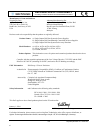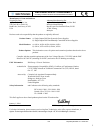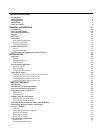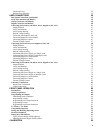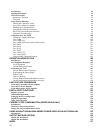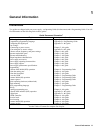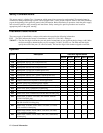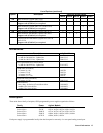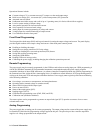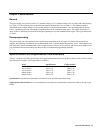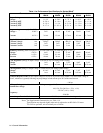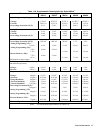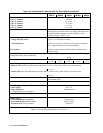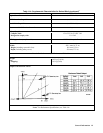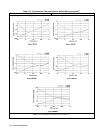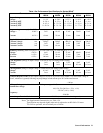General Information 14
Operational features include:
■ Constant voltage (CV) or constant current (CC) output over the rated output range.
■ Built-in overvoltage (OV), overcurrent (OC), and overtemperature (OT) protection.
■ Automatic turn-on selftest.
■ Pushbutton nonvolatile storage and recall of up to 5 operating states (4 in Series 668xA/669xA supplies).
■ Local or remote sensing of output voltage.
■ Auto-parallel operation for increased total current.
■ Series operation for increased total voltage.
■ Analog input for remote programming of voltage and current.
■ Voltage output for external monitoring of output current.
■ User calibration from the front panel.
Front Panel Programming
The front panel has both rotary (RPG) and keypad controls for setting the output voltage and current. The panel display
provides digital readouts of the output voltage and current. Other front panel controls permit:
■ Enabling or disabling the output.
■ Setting the overvoltage protection (OVP) trip voltage.
■ Enabling or disabling the overcurrent protection (OCP) feature.
■ Saving and recalling operating states.
■ Setting the GPIB address.
■ Reading GPIB error message codes.
■ Calibrating the power supply, including changing the calibration protection password.
Remote Programming
The power supply may be remotely programmed via the GPIB bus and/or from an analog input port. GPIB programming is
with SCPI (Standard Commands for Programmable Instruments) commands that make the power supply programs
compatible with those of other GPIB instruments. (A software-controlled Compatibility Mode also permits programming in
the command set of the Agilent 6030xA Autoranging Series.) In addition to control functions, SCPI programming permits
writing to the front panel LCD and complete calibration functions. Power supply status registers permit remote monitoring
of the following conditions:
■ Overvoltage, overcurrent, overtemperature, and unregulated states.
■ Operating mode (constant voltage or constant current).
■ State of the RI (remote inhibit) input signal.
■ Power-on status (PON).
■ Status of the output queue (QYE).
■ Pending triggers (WTG).
■ GPIB interface programming errors (CME, DDE, and EXE).
■ Calibration state (enabled or disabled).
The status registers can be programmed to generate an output fault signal (FLT) upon the occurrence of one or more
selected status events.
Analog Programming
The power supply has an analog port for remote programming. The output voltage and/or current of the power supply may
be controlled by individual dc programming voltages applied to this port. The port also provides a monitor output that
supplies a dc voltage proportional to the output current.



